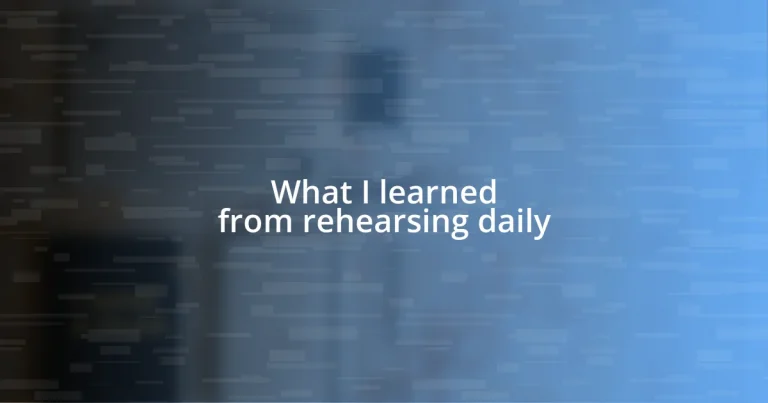Key takeaways:
- Daily rehearsal builds confidence, understanding, and discipline, transforming anxiety into excitement and improving performance skills.
- Effective techniques like spaced repetition, visualization, and improvisation enhance practice efficiency and creativity.
- Measuring progress through tangible milestones, self-reflection, and feedback helps track growth and reinforces a positive mindset.
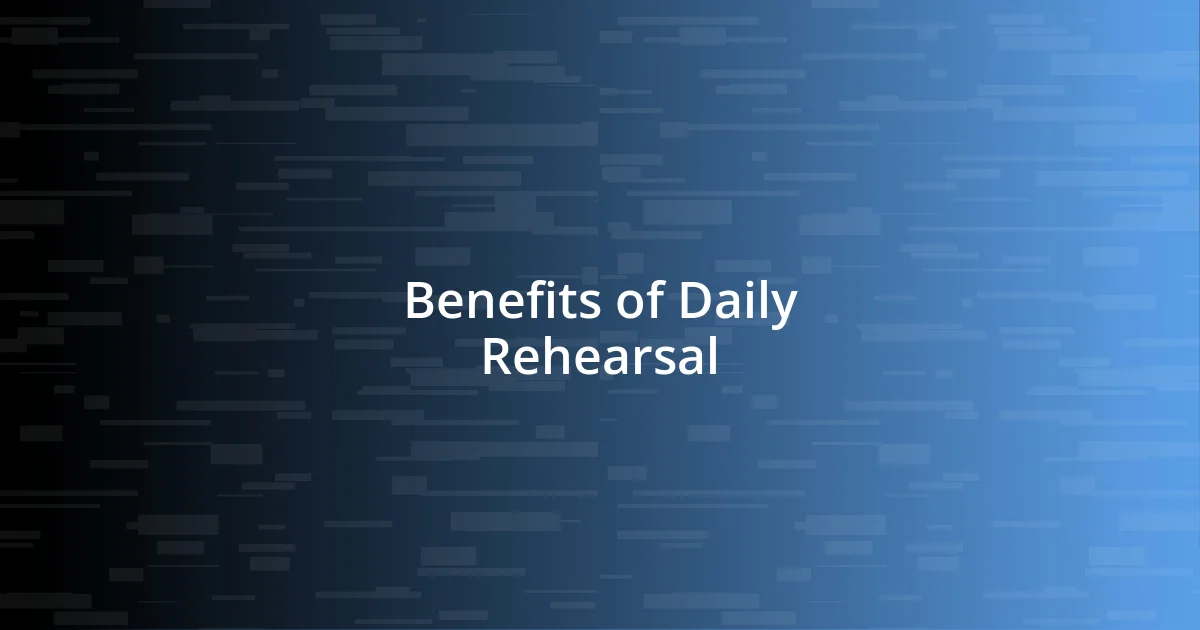
Benefits of Daily Rehearsal
Practicing daily not only sharpens skills but also builds unparalleled confidence. I remember the butterflies in my stomach before each performance, but as I committed to rehearsing every day, I found that familiar surge of anxiety transformed into excitement. Have you ever noticed how repetition helps you feel more at home with your material?
Daily rehearsal cultivates a deeper understanding of the craft and enhances creativity. For instance, when I dedicated time each day to explore nuances in my performance, I began to discover layers I hadn’t considered before. Have you ever had those “aha” moments where everything suddenly clicks? These insights emerged for me only after investing consistent effort into my practice.
Moreover, a daily routine instills discipline, which is invaluable in any field. I can still recall the mornings when I pushed through fatigue to rehearse; those were the days my focus sharpened. Don’t you agree that this routine transformed mere practice into a habit that enriched my life beyond rehearsals?
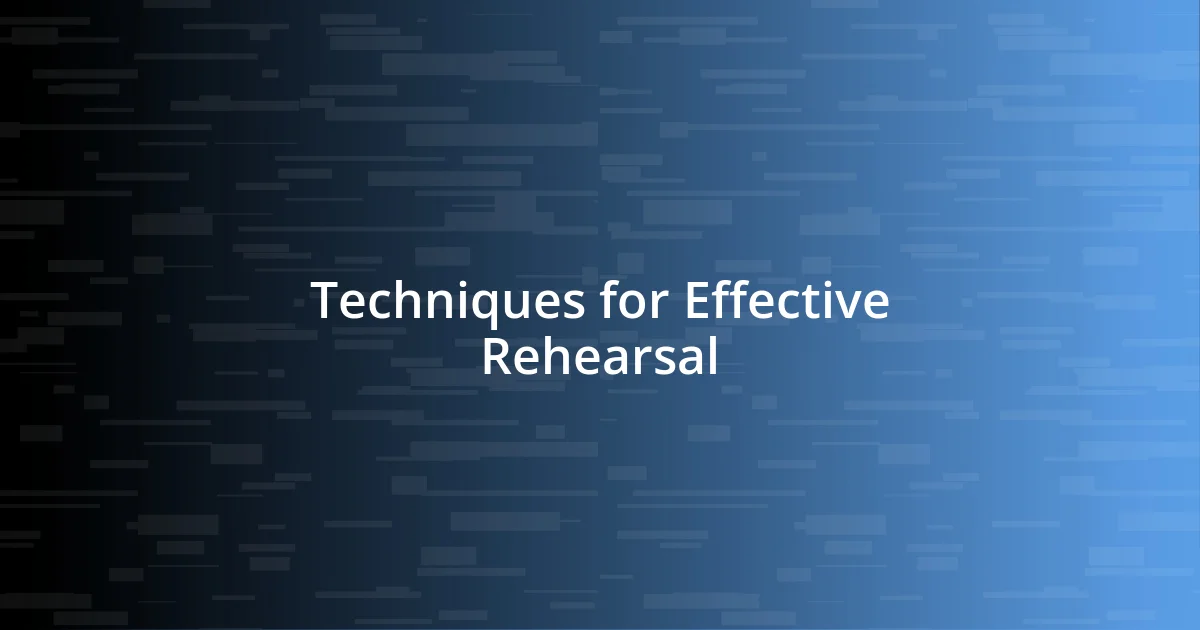
Techniques for Effective Rehearsal
Rehearsal techniques can greatly enhance the effectiveness of your practice sessions. One method I’ve found invaluable is the spaced repetition technique. By revisiting material at strategic intervals, rather than cramming, I’ve experienced that information sticks better over time. It’s like planting seeds; the more I nurture them, the stronger they grow. Have you ever noticed how giving your mind a break can actually help deepen your understanding?
Another technique is visualization. I often find myself closing my eyes and picturing the performance in vivid detail, feeling the emotions and movements as if I were on stage. This mental rehearsal has sometimes felt more powerful than physical practice. Have you tried picturing your success? It’s fascinating how visualization can prepare you mentally for what’s to come.
Incorporating improvisation into daily rehearsals is another game-changer I’ve discovered. By allowing myself the freedom to deviate from the script, I tapped into a wellspring of creativity I didn’t know existed. Some of my best ideas emerged when I opened the door to spontaneity. Have you ever surprised yourself by embracing the unexpected during practice? I did, and it led to incredible growth.
| Technique | Description |
|---|---|
| Spaced Repetition | Review material at intervals to enhance retention. |
| Visualization | Mental practice by picturing the performance in detail. |
| Improvisation | Breaking away from the script to foster creativity. |
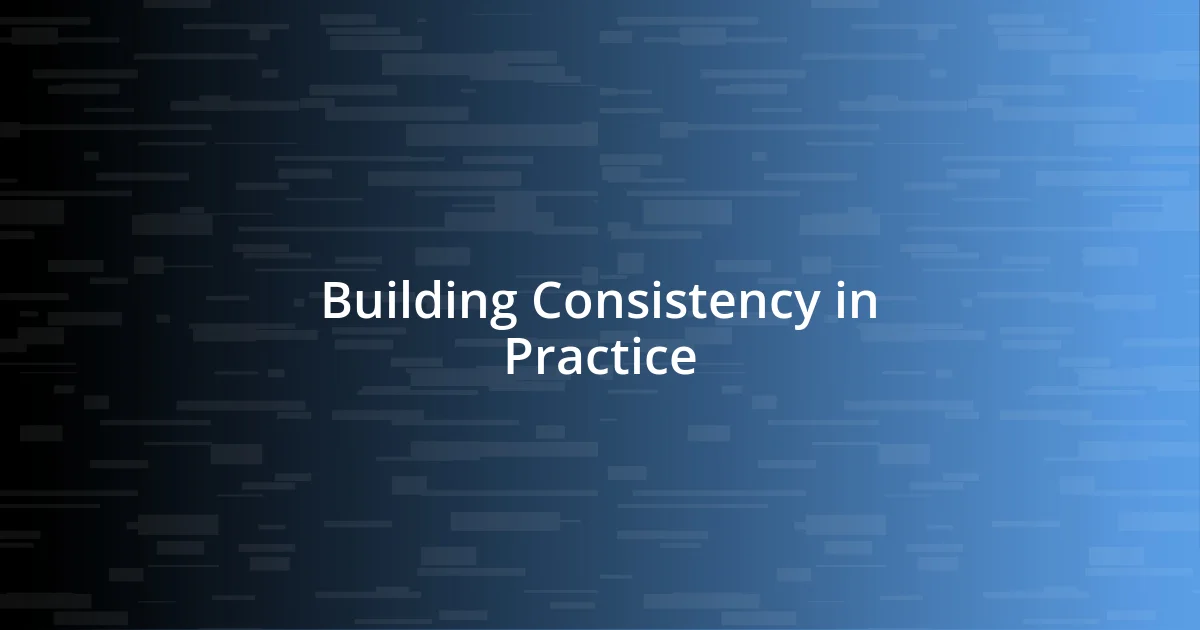
Building Consistency in Practice
Building consistency in practice has been a revelation for me. Initially, I found it challenging to stay committed, but I noticed that setting aside a small, dedicated block of time each day created a rhythm. There’s something almost meditative about that routine – it became a cozy corner of my day where I sought growth. The more I practiced, the more effortless the material became, which only fueled my desire to learn more.
Here’s what I discovered about building that consistency:
- Set Clear Goals: Establishing specific objectives keeps you motivated. It’s like having a map; each practice session is a step on that journey.
- Create a Schedule: I learned the importance of blocking out time in my day, treating it with the same respect as any important meeting.
- Stay Accountable: Sharing my goals with a friend or mentor created a layer of accountability that I found incredibly helpful.
- Celebrate Small Wins: I made it a point to recognize my progress, no matter how minor. Those moments of joy kept my spirits high.
- Be Kind to Yourself: There were days I fell short, and I had to remind myself that it’s okay. Learning is not always linear; perseverance matters more.
Through these practices, I developed a rhythm where each note of effort resonated with the next, creating a beautiful symphony of growth.
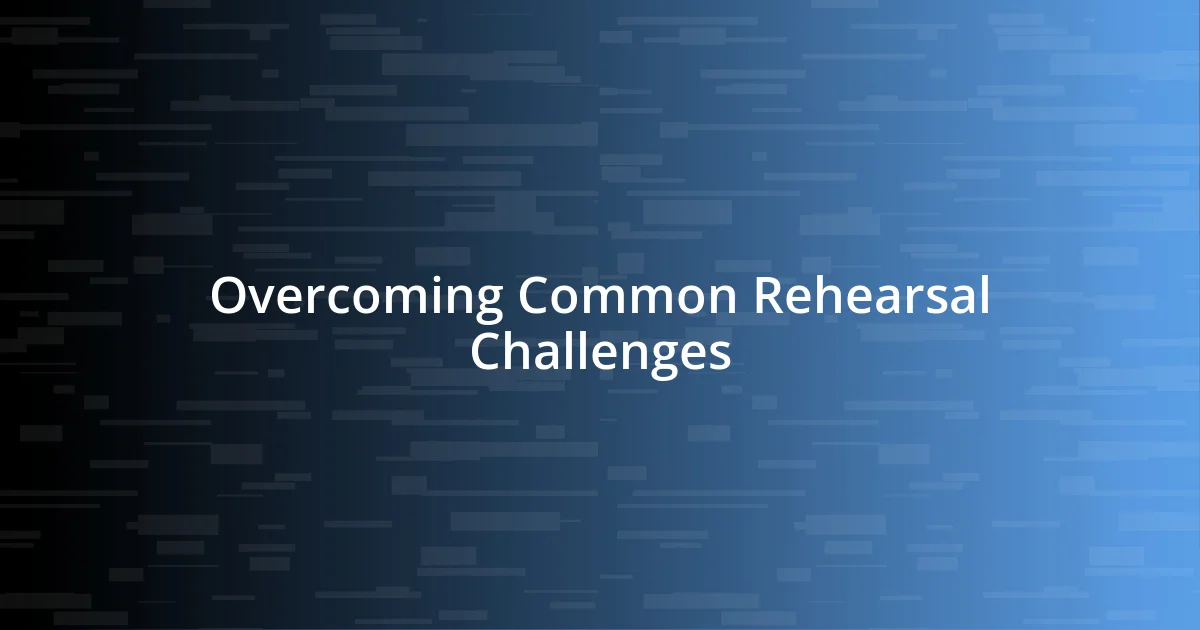
Overcoming Common Rehearsal Challenges
Rehearsing daily isn’t without its hurdles, and I’ve definitely faced my share. One of the most daunting challenges was overcoming self-doubt before each rehearsal. I recalled moments when I’d freeze up, worried about making mistakes. But then I started embracing those jitters as part of the process. I realized that everyone experiences them; it’s just a natural reaction. Have you felt that way before? I would remind myself that every mistake is an opportunity to learn, transforming my initial fear into a powerful motivator.
Another obstacle I’ve come to terms with is maintaining focus during long practice sessions. Early on, I struggled with fatigue and my mind would wander, turning my rehearsals into a slow grind. To remedy this, I implemented short, intentional breaks into my routine. Now, whenever I feel my attention waning, I take a few minutes to step away and recharge. It’s incredible how such a small change can refresh my mind, making me eager to dive back in. Have you tried pacing yourself during practice? It might just be the secret sauce you need.
Finally, managing external distractions proved another barrier in my rehearsals. At times, I’d get frustrated with noise or interruptions, which disrupted my flow. Instead of letting this affect my attitude, I began creating a dedicated rehearsal space that minimizes disruptions. Relocating to a quieter corner in my home has been transformative. I’ve learned that when I eliminate distractions, my creativity flourishes. What environments do you find most conducive to your practice? Finding the right atmosphere can make a world of difference.

Enhancing Focus Through Repetition
Enhancing focus through repetition has been one of the most rewarding aspects of my daily rehearsals. I vividly remember the first time I played a challenging piece of music repeatedly—I felt like I was on autopilot, but gradually, the notes started to sink in. This focused repetition honed my concentration, allowing my mind to latch onto the intricate details I initially overlooked. Have you ever found yourself so deep in practice that time seemed to disappear? It’s in those moments that I truly discover what focus feels like.
As I continued this journey, I learned that repetition does more than build familiarity; it sharpens my ability to stay present. Early on, I realized my thoughts would drift while trying to master a particular section. Now, when I encounter a tricky part, I break it down, repeating it in slices until I can play it flawlessly. Each iteration demands my full attention, pulling me deeper into the moment. The transformation from distraction to engagement was liberating—have you experienced that shift?
Moreover, connecting emotions to my repetitions has proven invaluable. When I focus on the feelings behind the music, I find greater clarity and purpose during practice. For instance, I remember working on a piece that evoked nostalgia; each note carried an emotional weight that heightened my concentration. I would ask myself, “What does this phrase mean to me?” This not only centered my focus but also brought a new level of intensity to my rehearsals. How do emotions play a role in your practice? Integrating feelings can turn a routine exercise into a profound experience.
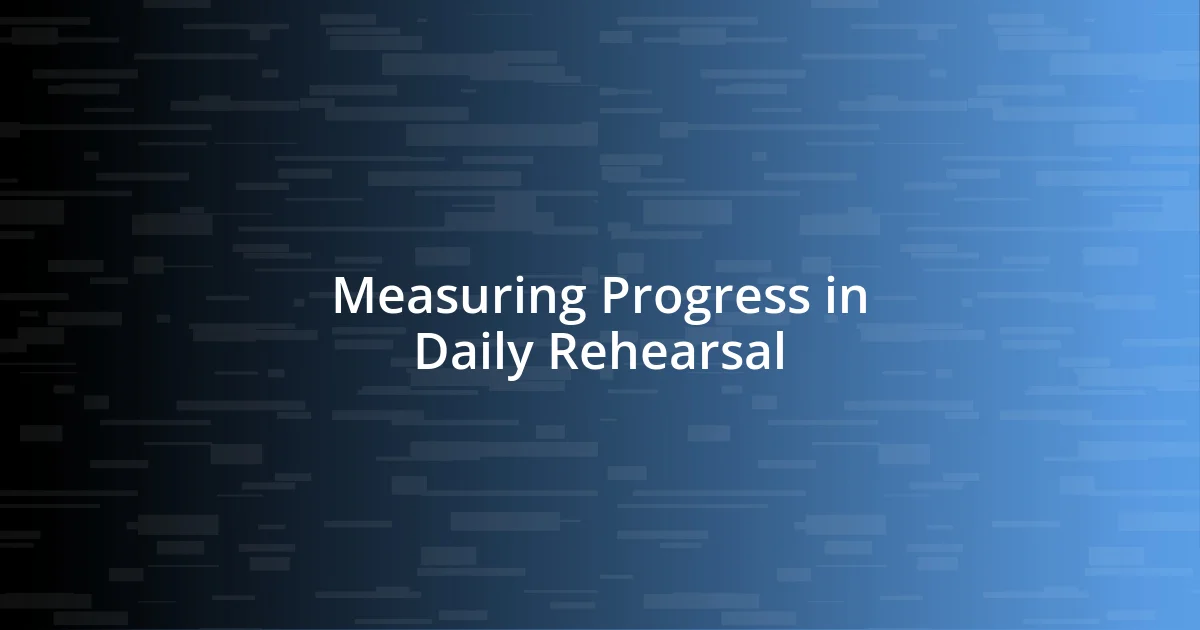
Measuring Progress in Daily Rehearsal
Measuring progress in daily rehearsal can sometimes feel like a daunting task, but I’ve found it’s all about setting tangible milestones. I remember creating a chart where I could track small achievements, like mastering a specific section of a piece. Seeing those little victories documented made me realize just how far I had come, often sparking a sense of pride that fueled my motivation. Have you tried visual methods to track your growth? It might surprise you how motivating a simple chart can be.
I’ve also learned the importance of self-reflection during this journey. After each rehearsal, I take a moment to jot down what went well and what I found challenging. One day, I noticed that while I had struggled with timing, my expression had improved significantly. This practice not only helps me understand where I need to focus but also reinforces the idea that progress isn’t always linear. Have you ever had a breakthrough in one area while struggling in another? Recognizing these nuances keeps me grounded and encourages a growth mindset.
Moreover, feedback has played a crucial role in measuring my progress. I often record my rehearsals and listen back, which can be both enlightening and humbling. I remember the first time I did this; I was shocked by how uneven my tempo was but also excited to hear my dynamics come alive. Those recordings are honest reflections of my abilities and allow me to see improvements I might overlook in the moment. What about you? Have you considered recording your practice sessions? It can be a game-changer in understanding your growth and areas for enhancement.

Long-term Effects on Performance
I’ve noticed that the long-term effects of daily rehearsals are far-reaching, especially regarding my overall performance. Over time, I’ve developed a deeper muscle memory that empowers me to play complex pieces with confidence. I vividly recall struggling with a particularly challenging piece months ago, but after consistent practice, I found that my fingers danced over the keys almost effortlessly. It’s fascinating to see how time invested in rehearsal can transform anxiety into ease. Have you felt that shift in your skills over time?
Another remarkable outcome I’ve experienced is an increase in resilience. I used to get easily discouraged by mistakes, but continuous rehearsals taught me to embrace them as opportunities for growth. I remember hitting a wrong note repeatedly during one session—I was frustrated at first, but I kept pushing through. By acknowledging that each error was part of my journey, I cultivated a mindset that allowed me to bounce back stronger. This resilience has not only improved my technical skills but also fortified my emotional approach to performance. How do you manage setbacks in your practice?
Furthermore, the cognitive benefits of rehearsing daily cannot be overstated. I’ve found that regular practice sharpens my mental agility and enhances my ability to recall music effortlessly. I often challenge myself to play a piece without sheet music, and this exercise has significantly strengthened my memory and understanding of the music’s structure. There was a moment during a performance when I momentarily blanked on the next note, but thanks to my diligent rehearsals, I instinctively navigated back. This interplay of memory and immediate response demonstrates how long-term practice molds not just our technique but our ability to handle the unexpected. Have you ever relied on your training in a pinch like that?












